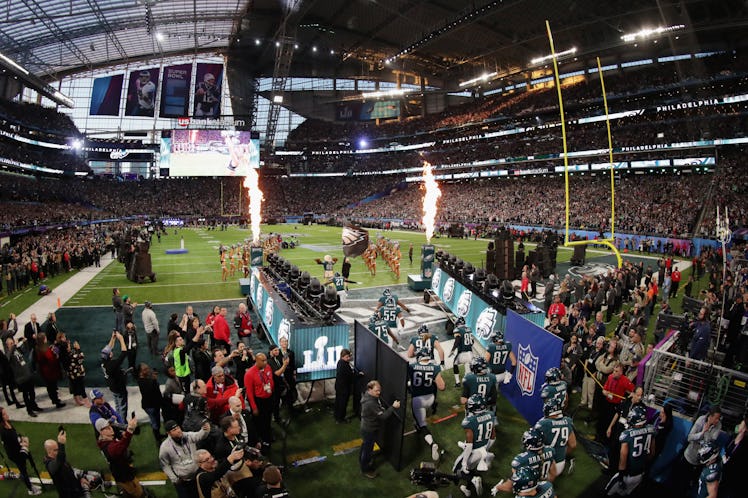
Players Stood For The National Anthem At The Super Bowl, But This Surprising Group Took A Knee
When it comes to sports and political protests, 2017 was a doozy. In September, President Donald Trump chose to get involved in and comment on NFL players’ protests against police brutality and racial bias — highlighting the protests and throwing them back into the spotlight. In the weeks that followed, the protests took off like never before. So in the days before football’s biggest night of the year, it’s not surprising if everyone was on the lookout for who kneeled for the National Anthem at the Super Bowl.
This may or may not surprise you, but it appeared that not a single player or team member from both the Philadelphia Eagles and the New England Patriots kneeled in protest tonight. Before today, it wasn't clear if the players would decide to make a statement on football's biggest night and continue the #TakeAKnee protest that has persisted throughout this season. And from the looks of it, the players decided to opt out tonight. But a few spectators did notice a few people on the field that were kneeling — the flag bearers.
Twitter users pointed this out and called it a double-standard, referencing that the players may have been asked not to kneel during the biggest sporting event of the year. However, just because the flag bearers took a knee doesn't mean the act was necessarily political. It could simply be protocol positioning for their duty.
Either way, Twitter erupted with commentary on the perceived double-standard.
Before the game even happened, fans were assured that whatever went down, we would get to see it live. NBC Sports executive producer Fred Gaudelli said that the game — potential protests included — was going to be treated just the same as any other live event. “The Super Bowl is a live event, just like 'Sunday Night Football," he said, according to NBC Washington. "When you’re covering a live event, you’re covering what's happening. So if there are players that choose to kneel, they will be shown live."
He did add, however, that it didn't seem likely that it would happen at the Super Bowl. "Since Thanksgiving, a lot of that has kind of dissipated and died down," he said. "It’s certainly possible it could happen again.”
The lack of protests at the Super Bowl was the culmination of a pretty tumultuous football season (politically speaking). Back in late September, Trump called out the protests, in which players knelt in during the national anthem, via Twitter. He wrote, "If NFL fans refuse to go to games until players stop disrespecting our Flag & Country, you will see change take place fast. Fire or suspend!"
Trump's tweet kick-started a weeks long spate of players choosing to take a knee in response to the president’s remarks, with entire teams participating in the protest. On September 24 alone, over 150 players took the knee or protested in some other way — including 16 members of the New England Patriots. But the following week, on Oct. 1, the Patriots players chose to stand on the sidelines for their game against the Carolina Panthers, while multiple players across the NFL — including the entirety of the New Orleans Saints — knelt in protest.
And when it comes to the other side of the game, the chances of fans seeing their favorites kneel were slim to begin with, but that didn't mean there were no demonstrations. Throughout the season, the Philadelphia Eagles chose not to kneel, but players such as Malcolm Jenkins and Rodney MacLeod raised their fists in protests. So it seemed unlikely that they would kneel — but hey, you never know.
The protests were originally started in August 2016 by former San Francisco 49ers quarterback, Colin Kaepernick as a protest against racial bias and police brutality. During the 2016 preseason, Kaepernick sat during the national anthem (he later changed his action to kneeling as a gesture of respect to veterans who were troubled by the protest). He explained to NFL.com,
I am not going to stand up to show pride in a flag for a country that oppresses black people and people of color. To me, this is bigger than football and it would be selfish on my part to look the other way. There are bodies in the street and people getting paid leave and getting away with murder.
After the protests took off — and particularly after the president weighed in — the protest became extra controversial, with many people debating whether the protests were respectful, appropriate to the arena, and even what they were ultimately about.
Well, as of today, the controversy about the protest is officially over. At least until next football season.